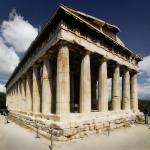|
This section contains 2,366 words (approx. 8 pages at 300 words per page) |

|
Founder of Epicureanism.
The English word "epicure," meaning a person who loves good food and drink, is taken from Epicurus and the Epicureans. It is a singular distortion, for the Epicureans believed that man should restrict his desires to those that spring from the natural appetites—gourmet food and fine wines not being among them. Epicurus (341–270 B.C.E.) was a hedonist in that he believed that the proper goal of all activity was pleasure, but he had an austere definition of it, in that his definition of pleasure was simply the absence of discomfort or pain. The Epicurean ate to rid himself of the discomfort of hunger and no more. According to this philosophy, he should guard himself against anguish at the death of a close friend by having no close friends. Insatiable desire for wealth, power, and fame can never be satisfied, and so they should...
|
This section contains 2,366 words (approx. 8 pages at 300 words per page) |

|




